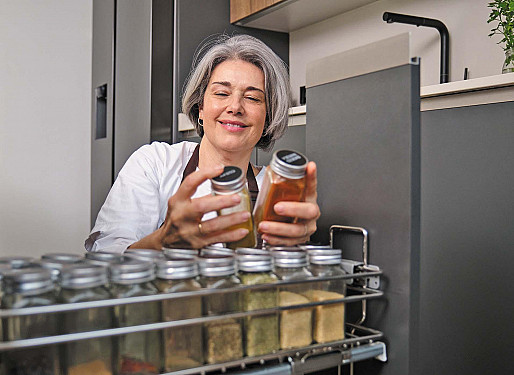Precious metals and other important minerals for health
Make sure your diet meets the recommended mineral targets.

Image: © fstop123/Getty Images
Gold, silver, and platinum get all the attention as the world's most precious metals. But they're more precious for the global economy than for human health. Instead, other metals and minerals (metals are one type of mineral) are more important for our health (see "What essential metals do for us"). Indeed, some of them are so important that we can't live without them. "Each one plays a role in hundreds of body functions. It may take just a very small quantity of a particular mineral, but having too much or too little can upset a delicate balance in the body," says Dr. Bruce Bistrian, chief of clinical nutrition at Beth Israel Deaconess Medical Center.
What essential metals do for usMany metals are used to make strong and durable everyday objects, like copper pipes or iron skillets. But they don't form such strong and durable objects in our bodies. Instead, many essential metals are needed to activate enzymes — molecules with important jobs in the body. And metals have many other essential roles as well. For example:
|
Two groups of essential minerals
Essential minerals — that is, those necessary for human health — are classified into two equally important groups: major minerals and trace minerals.
The major minerals, which are used and stored in large quantities in the body, are calcium, chloride, magnesium, phosphorus, potassium, sodium, and sulfur. The trace minerals are just as vital to our health as the major minerals, but we don't need large amounts. Minerals in this category include chromium, copper, fluoride, iodine, iron, manganese, molybdenum, selenium, and zinc.
Where do they come from?
We don't manufacture essential minerals in the body. We get them from our diet. The minerals come from rocks, soil, and water, and they're absorbed as the plants grow or by animals as the animals eat the plants.
Fresh foods aren't our only source of dietary minerals, however. Some processed foods, like breakfast cereal, may be fortified with minerals. And if you walk into any drugstore or look online, you'll see endless options for mineral supplements in the form of pills, powders, and chewables.
Easy to obtain
Dr. Bistrian says that when you eat a healthy diet that includes a variety of vegetables, beans, fruits, whole grains, lean protein, dairy products, and unsaturated fats (like olive oil), you're likely consuming all the healthy minerals you need. You probably don't need to pay attention to your daily intake.
For example, adequate intake of manganese is 1.8 milligrams (mg) per day for women and 2.3 mg per day for men. It's fairly easy to meet those goals with half a cup of cooked spinach (0.84 mg manganese), half a cup of cooked brown rice (1.07 mg manganese), and an ounce of almonds (0.65 mg manganese). The same is true for many dietary minerals, like chromium, copper, molybdenum, sodium, and zinc; eating a healthy diet should cover your needs.
Not as easy
But some minerals are harder to obtain in the right amounts. For example:
Calcium. Deficiency is common in older adults, especially in women and in people who eat few dairy products. A lack of calcium in the body increases the risk for brittle bones and fractures.
Iron. Women lose a lot of iron when they pass menstrual blood, and their bodies can become deficient in iron. Another cause of iron deficiency is less well known. "Obese individuals, especially premenopausal women, have a high risk for iron deficiency, in part because severe obesity is associated with low-level inflammation, which reduces iron absorption and use by the body," Dr. Bistrian says. Low iron levels can lead to iron-deficiency anemia. In this condition, there are too few red blood cells, and the red blood cells are too small. That makes it harder for the blood to carry oxygen to organs.
Magnesium. "Some drugs, like diuretics to treat blood pressure, cause you to excrete magnesium in urine. And magnesium also is commonly lacking in people with diseases that cause diarrhea," Dr. Bistrian says.
Potassium. Most older adults take in only about half to three-quarters of the potassium they should, according to the Department of Agriculture. A low-potassium, high-sodium diet is thought to contribute to high blood pressure.
Pay attention to intake
If you fall into any of those high-risk categories, you may want to make a concerted effort to consume enough healthy minerals (see "Gold-medal sources of dietary minerals").
These are the recommended targets for the minerals in which people are most likely to be deficient:
-
Calcium: Men need 1,000 mg per day until age 70, and 1,200 mg after that. Women ages 51 or older need 1,200 mg of calcium per day.
-
Iron: 8 mg per day for adult men and for women starting at age 50 (or whenever menstruation ends).
-
Magnesium: 420 mg per day for men 31 or older, and 320 mg per day for women 31 or older.
-
Potassium: 4,700 mg per day.
Gold-medal sources of dietary minerals
|
Is diet enough?
Essential minerals are most potent when they come from food. But if you're struggling with deficiencies, you may need to take supplements. If so, use caution: ingesting too much of a mineral supplement can be harmful. For example: "If you get too much supplemental iron, you can overwhelm your ability to regulate iron. This creates oxidants called free radicals, which may accelerate heart disease and liver disease," says Dr. Bistrian.
Another problem: taking too much calcium in a daily supplement. That's been linked to kidney stones and possibly cardiovascular disease. Dr. Bistrian recommends getting as much calcium as you can from food and taking a low-dose supplement only to reach the rest of your goal. To help your body absorb the calcium, add a vitamin D supplement of between 600 and 800 international units.
But note: taking calcium supplements to prevent falls and fractures is hotly debated. In April, the U.S. Preventive Services Task Force released new guidelines saying there is not enough evidence to support this practice. "But the new guidelines apply to generally healthy adults without known osteoporosis or a high risk of fractures or falls. They do not override the Institute of Medicine guidelines about calcium and vitamin D intake," says Dr. JoAnn Manson, chief of preventive medicine at Harvard-affiliated Brigham and Women's Hospital. "The new guidelines acknowledge inconsistent research and emphasize that it's important to go beyond supplements to prevent falls and fractures by encouraging physical activity and addressing disorders related to balance, vision loss, and medication side effects."
The bottom line: Your individual health will determine your essential mineral needs. Work with your doctor to develop targets for dietary minerals that will enrich your health.
Disclaimer:
As a service to our readers, Harvard Health Publishing provides access to our library of archived content. Please note the date of last review or update on all articles.
No content on this site, regardless of date, should ever be used as a substitute for direct medical advice from your doctor or other qualified clinician.















